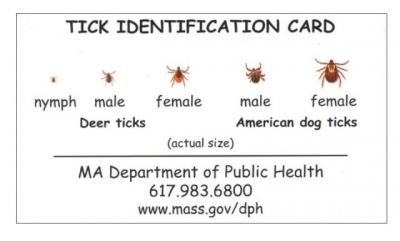Naturalist’s Corner: Ticks and Mosquitoes
Deer ticks, a common species in Massachusetts, have a two year lifespan. They lay eggs in the spring, which hatch into larvae in the summer. This larval stage is the first feeding stage of the deer ticks. The larva transforms into the nymph in the fall, which becomes active again in May, the second feeding stage. The third feeding stage is when the nymph becomes an adult. A common disease associated with ticks is Lyme disease.
Most adult male mosquitoes only live for about one week, and adult females typically live for two weeks. In certain ideal conditions, mosquitoes can live up to 2 months. The four stages of the mosquito life cycle are egg, larva, pupa, and adult. Common diseases associated with mosquitoes include West Nile Virus (WNV) and Eastern Equine Encephalitis (“Triple E” or EEE).
To learn more about tick and mosquito life cycles, what it means to be a bridge vector, how warming temperatures can affect disease transmission, and the best ways to protect yourself from tick and mosquito bites, watch the recording of the Wareham Land Trust’s program “The Bugs That Bug You,” a talk by Plymouth County Entomologist Educator Blake Dinius. https://www.youtube.com/watch?v=chPj1u15p9g
May is National Lyme Disease Awareness Month, so brush up on your tick knowledge to be prepared for hiking and other outdoor activities this spring! And remember, whenever you spend time outdoors - check yourself for ticks!













